Start Your Free Trial!
Sign up to our newsletter, stay updated on news and exclusive offers from EaseUS. Don't worry, if you change your mind, you can unsubscribe at any time, free of charge. We value your privacy (Privacy Policy).
Page Table of Contents
Speed Up Windows 11 by 10 MethodsHOT
1. Turn Off Visual EffectsHOT
2. Enable Power PlanHOT
3. Extend C Drive to Make Windows 11 FasterHOT
4. Enable Storage SenseHOT
5. Disable Startup ProgramsHOT
6. Disable Startup AppsHOT
7. Turn Off NotificationsHOT
8. Clean Up Temporary FilesHOT
9. Defrag Hard Disk for OptimizationHOT
10. Use ReadyBoost to Speed Up Windows 11HOT
About the Author
Hot Topics
Updated on Apr 28, 2025
Windows 11 surprises us with its interface, gaming, Microsoft Store, and more. However, a negative voice does exist about Windows performance, such as Windows 11 running slow. How to speed up Windows 11? How to make Windows 11 faster? In this article, we will show ten ways to optimize Windows 11 performance for smooth use.
Quick Navigation:
Visual effects are used to decorate your Windows appearance. If your Windows OS is running slow, it’s better to turn off some visual effects.
Step 1. Click the Search icon and type advanced to the search box. Click View advanced system settings.

Step 2. Under the Performance section, click the Settings button.
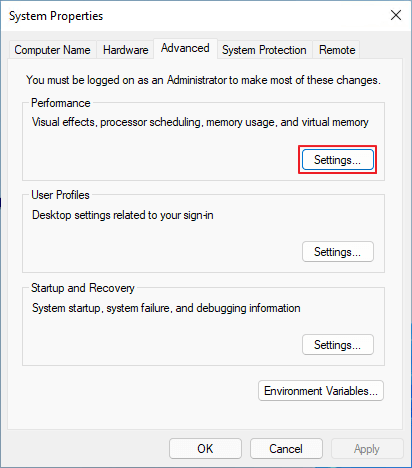
Step 3. Once the Performance Options pop up, tick Adjust for best performance. You can see the option boxes below, tick Show thumbnails instead of icons, and Smooth edges of screen fonts.
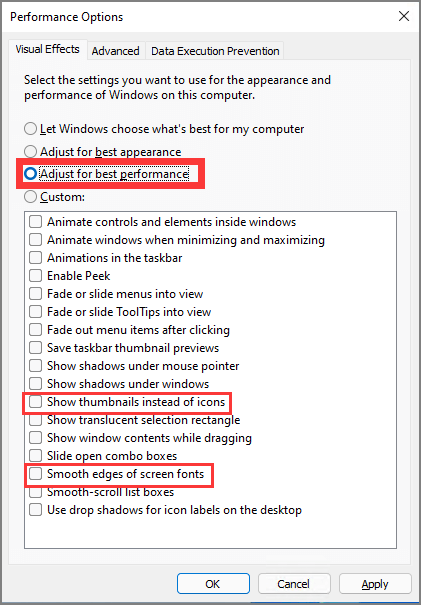
Step 4. Click Apply and then click OK.
Power Plan design to manage how to consume and save power.
Step 1. Open Start Menu and type power plan in the search box. Click Choose a power plan.
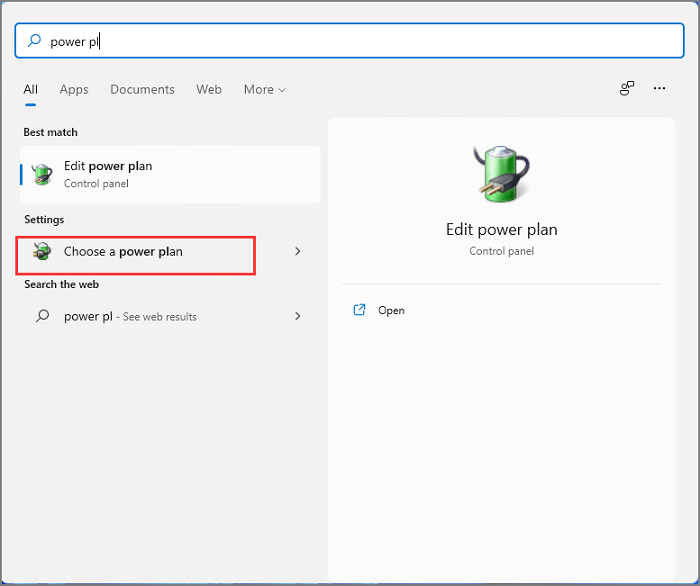
Step 2. Search for High-Performance on the next screen > Change Plan Settings > Change Advanced Power Settings
Step 3. Expand Processor power management and confirm the Minimum processor state is 100%.
Another way to speed up Windows 11 computers is to extend your system drive for better performance. You can use a professional partition software, EaseUS Partition Master, to resize C drive easily. Enlarge the system drive space can improve your device performance. So give it a try. This professional software will not let you down.
In addition to resizing function, this tool can create/format/delete/merge/wipe partitions. So you can trust this tool for safe use.
Extend System C drive with unallocated space
If you also want to know how to speed up Windows 10, read on to get more details:
Step 1. Click the Windows icon on the centered toolbar and click Settings.
Step 2. Navigate to System > Storage, click Storage.
Step 3. Under the Storage part, turn on the storage sense button.
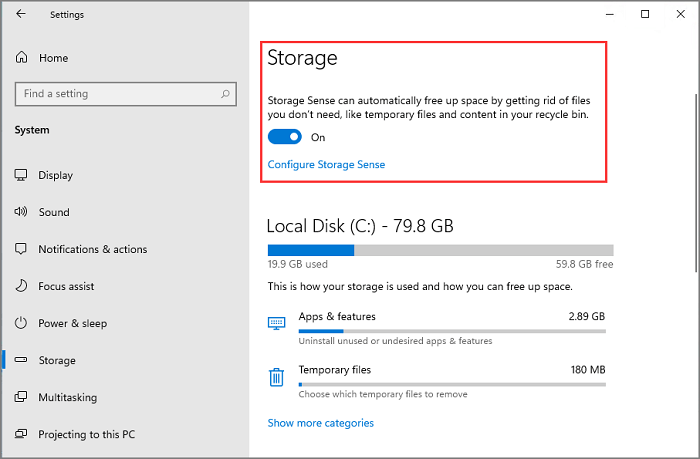
Step 4. Move to Configure Storage Sense page, and choose your cleanup schedules.
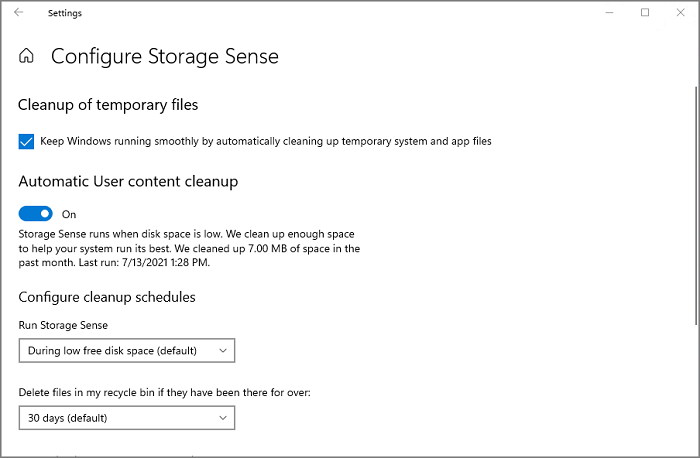
Step 1. Click the search icon on the centered toolbar, type Task Manager on the search box.
Step 2. Click the Startup tab and you can a bunch of apps running at startup.
Step 3. Right-click apps you don't want to start at startup, and click Disable.

Step 1. Click on the Windows icon to open Start Menu. Click Settings.
Step 2. Type Startup on the search box and select Startup Apps from the result.
Step 3. Turn off the unnecessary apps you don't want to start automatically.
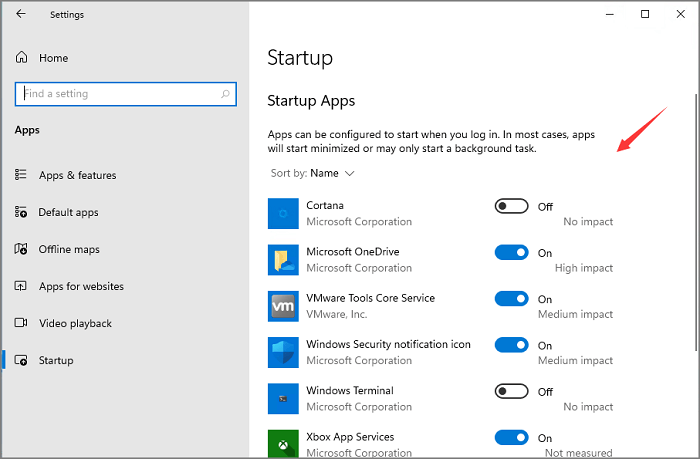
Step 1. Open Settings on your computer.
Step 2. Go to the System tab and then select Notifications & actions from the left panel.
Step 3. Scroll down and you can see the Notification from apps and other senders part. Turn off the notifications from unwanted apps. Make sure do not disable notifications from important apps.

Step 1. Open the Settings from Start Menu.
Step 2. Navigate to the System tab and click Storage.
Step 3. On the next screen, you can see the Temporary files.

Step 4. Click Temporary files and check the files you want to remove.
Step 5. Once it has been done, select Remove files.
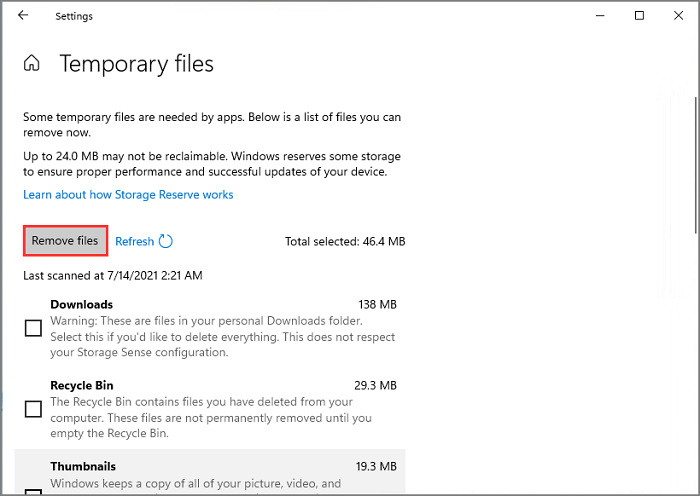
Step 1. Type Defragment and Optimize Drives on the search box.

Step 2. You can see the drive options here. Select the system drive and click Optimize button.

Step 1. Insert a USB or SD card into your computer.
Step 2. Check your device on Windows Explorer. Right-click the USB and click the Format option from the menu.
Set your "File system" as NTFS, choose "Allocation unit size", and check the Quick Format. Click Start.
Step 3. Once the formatting is finished, right-click USB and select Properties.
Step 4. Click the ReadyBoost tab > Tick Use this device > Click OK.
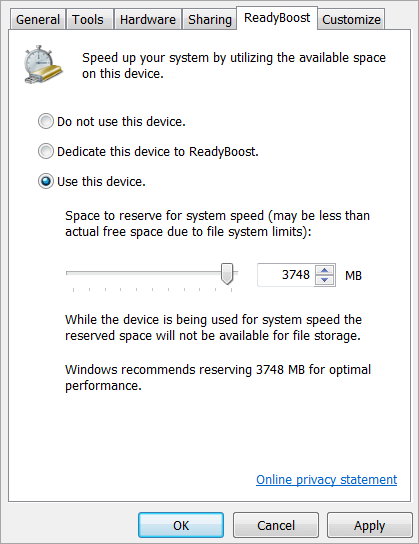
In this article, we collected ten tips to make Windows 11 faster, including turn off visual effects, change Power Plan, extend C drive, turn on storage sense, and more. No matter what methods you try, make sure your important files are safe.
How Can We Help You
Sherly joined EaseUS in 2022 and she has always loved writing articles and enjoys the fun they bring. She receives professional training here, focusing on product performance and other relative knowledge. She has written over 200 articles to help people overcome computing issues.
Written by Tracy King
Tracy became a member of the EaseUS content team in 2013. Being a technical writer for over 10 years, she is enthusiastic about sharing tips to assist readers in resolving complex issues in disk management, file transfer, PC & Mac performance optimization, etc., like an expert.
It won't hot image your drives or align them, but since it's coupled with a partition manager, it allows you do perform many tasks at once, instead of just cloning drives. You can move partitions around, resize them, defragment, and more, along with the other tools you'd expect from a cloning tool.
Read MoreI love that the changes you make with EaseUS Partition Master Free aren't immediately applied to the disks. It makes it way easier to play out what will happen after you've made all the changes. I also think the overall look and feel of EaseUS Partition Master Free makes whatever you're doing with your computer's partitions easy.
Read MorePartition Master Free can Resize, Move, Merge, Migrate, and Copy disks or partitions; convert to local, change label, defragment, check and explore partition; and much more. A premium upgrade adds free tech support and the ability to resize dynamic volumes.
Read MoreIt won't hot image your drives or align them, but since it's coupled with a partition manager, it allows you do perform many tasks at once, instead of just cloning drives. You can move partitions around, resize them, defragment, and more, along with the other tools you'd expect from a cloning tool.
Read MoreI love that the changes you make with EaseUS Partition Master Free aren't immediately applied to the disks. It makes it way easier to play out what will happen after you've made all the changes. I also think the overall look and feel of EaseUS Partition Master Free makes whatever you're doing with your computer's partitions easy.
Read MoreRelated Articles
Windows 11 Slow? How to Improve Windows 11 Performance
![]() Tracy King/2025/04/28
Tracy King/2025/04/28
Does SSD Get Slower When Full? Fix SSD Slowing Down [Easy Tricks]
![]() Tracy King/2025/04/28
Tracy King/2025/04/28
How to Merge or Combine Partitions in Windows 11
![]() Tracy King/2025/04/28
Tracy King/2025/04/28
How to Test NVMe I/O Speed on Windows and Mac? [2025 Checklist]
![]() Tracy King/2025/04/28
Tracy King/2025/04/28
EaseUS Partition Master

Manage partitions and optimize disks efficiently
Your best companion for disk partitioning, MBR to GPT/GPT to MBR conversion,even OS migration
CHOOSE YOUR REGION
Start Your Free Trial!
Sign up to our newsletter, stay updated on news and exclusive offers from EaseUS. Don't worry, if you change your mind, you can unsubscribe at any time, free of charge. We value your privacy (Privacy Policy).
Start Your Free Trial!
Sign up to our newsletter, stay updated on news and exclusive offers from EaseUS. Don't worry, if you change your mind, you can unsubscribe at any time, free of charge. We value your privacy (Privacy Policy).